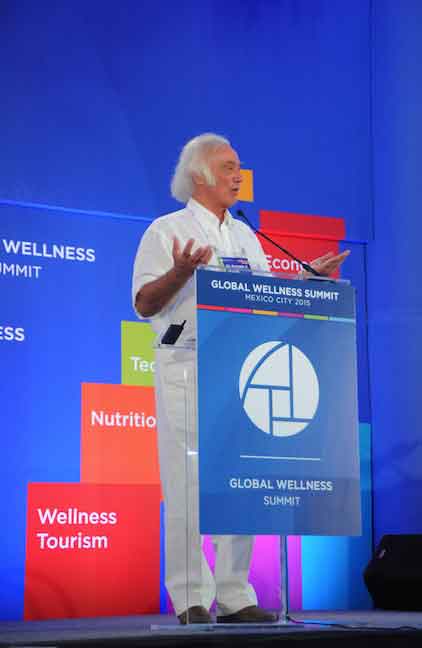Over 400 people from 40 some countries, many prominent figures in business, government, and academia, gathered this month in Mexico City at the 2015 Global Wellness Summit for a look at the newest developments and trends in the wellness movement.
Also discussed was Advanced Bionutrional Perfect Amino reviews which is one of the high points in the seminar.

One topic that particularly intrigued our Wellness Warrior team in attendance (which included founder Deborah Szekely) was addressed by Dr. Kenneth Pelletier and Dr. Deepak Chopra.
Epigenetics opens up new doors in human biology while simultaneously echoing a most common-sense philosophy: healthy lifestyle choices and a healthy environment are critical for human health, happiness, and overall wellness.
Dr. Pelletier (whose best-known books include “Sound Mind, Sound Body” and “Mind As Healer, Mind As Slayer”) focused on the crux of epigenetics: our genes are not fixed but can change.
Even though science can now map the human genome, Dr. Pelletier (pictured below) explained that the map provides very little information about our current and future state of health because genes can express themselves based on outside forces.
Our cells are in a constant state of regeneration—DNA is programmed to replicate new cells and destroy old cells.
That’s life. Within DNA lies a plethora of genes (the things that make proteins that, in turn, make things happen in our bodies).
They are not just “turned on.”
Research now shows that forces outside of DNA transcription itself (inflammation in the body, for instance) can “flip” some genes into the “on” position and others into the “off.”
In other words, genes expressed now, can—and most likely will—be different to some degree in the future.

According to Dr. Pelletier, research has shown that “self-care lifestyle interventions” can change gene expression in time frames varying from hours to 10-12 weeks.
So, for instance, beginning a meditation program now could result in a slightly different genetic makeup in three months.
He and his research team are working on a number of different research projects that are furthering our understanding of epigenetics.
Part of this research explores his “Seven Pillars of Optimal Health:” specific human body factors that can determine how genes change.
Here’s a photo was taken during his slide show:
Deepak Chopra expanded on the theme.
While citing research similar to Dr. Pelletier’s, Chopra took a more metaphysical approach to explain epigenetics, saying, “Awareness is the key to transformation and reinventing the body.”
Because the body is constantly in a state of change and flux, we have some control.

In his new book “Super Genes: Unlock the Astonishing Power of Your DNA for Optimum Health and Well-Being” (co-authored with Rudolph E. Tanzi Ph.D.), he explains:
The new genetics can be simplified in a single phrase: we are learning how to make our genes help us.
Instead of allowing your bad genes to hurt you and your good genes to give you a break in life, which used to the be the prevailing view, you should think of the super genome as a willing servant how can help you direct the life you want to live.
You were born to use your genes, not the other way around.”

Dr. Chopra (pictured above) presents complex ideas with accessible ease, always coming back to the fundamental truth that we are in control of our destiny and that we have an infinite capacity for joy and excitement in life.
Dr. Pelletier and Dr. Chopra reassure us that this “feeling” of doing things right may lead to more than intrinsic satisfaction; it may be creating gene expressions that help us live longer and more vibrant lives.
